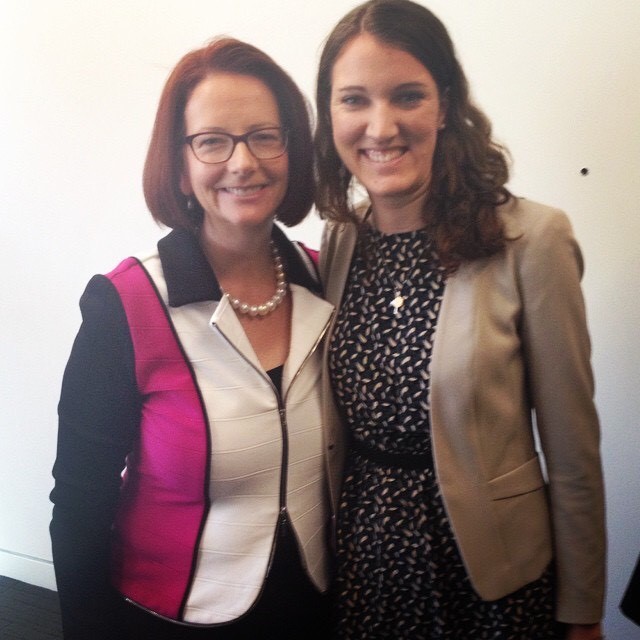 Story: Michael Rodden - student at QUT – Bachelor Business (Economics) and Journalism Images: Courtesy of Ellen Chambers
Story: Michael Rodden - student at QUT – Bachelor Business (Economics) and Journalism Images: Courtesy of Ellen Chambers
At 18, Ellen Chambers was fighting to get out of sand bunkers on the golf course. A decade on she is fighting to get others out of war bunkers. Ellen was fresh out of high school when she packed her bags to chase her golfing dream in the United States.
Green fairways were something she became accustomed to growing up as an aspiring golfer. She avoided bunkers to the best of her ability, but sometimes there was no stopping the white ball landing there. At times she felt like that golf ball, stuck in the sand.
Ellen grew up in the northern suburbs of Brisbane – a girl from a middle class background with hard-working parents and a loving family.
Ellen had a close relationship with her Dad, who enticed her into the sport, by simply letting her hit the ball around in the backyard. “He promised for my sixth birthday he would take me to get a proper golf lesson with a golf professional," Ellen says.
“I kind of never looked back … and when I got good enough, I started travelling to tournaments all around Queensland and Australia," she says. Moving to the United States on a half golfing scholarship seemed like the natural progression.
However, as a pragmatic person, she was never sure she would make it onto the professional golf circuit. So, Ellen hedged her bets by also attaining a half academic scholarship. This was to indulge her other passion in international relations, where she finds herself today – researching for organisations dealing with peace negotiation processes.
Ellen remembers her first few months at Lynn University, Florida as overwhelming and “scary". Not knowing anyone made day-to-day life difficult for her, whether it be setting up a bank account or grocery shopping.
Ellen's best friend from school, Nidean Dickson, says Ellen “was really struggling with the idea of leaving home. She was a bundle of nerves and was not used to making personal decisions".
Ellen says her parents knew she was anxious and introverted, but they believed in their quiet, determined daughter and knew it was the right path.
Things improved with the routine of university. “It was a very full-on lifestyle," Ellen says. Training with the golf team five days a week and weekend tournaments meant she missed a lot of classes.
Although, Ellen was extremely focussed on swinging her golf clubs, she accomplished hole-in-ones in another sense. She attained the highest Grade Point Average of 4.0 for her Bachelor's Degree in Arts (International Relations).
"It made sense to get a degree in International Relations," she says. She knew she wanted to pursue such a pathway, particularly in conflict resolution.
She won Scholar-Athlete of the year award at Lynn University and was nominated as a finalist for the National Collegiate Athletic Association (NCAA) Women of the Year Award.
This was until injury struck. A persisting back injury meant packing away her clubs, but at the same time this presented a fortuitous opportunity.
Initially upset, Ellen was grateful for where golf had taken her but says a career in golf “was probably not sustainable". It enabled her to explore her other passion in international relations.
Life after golf steered her to apply for a Master's Degree in Conflict Resolution.
Despite this, financial constraints meant further study in the US seemed out of the question.
However, her passion for conflict resolution would not abate. America was not done with her yet. Ellen set her sights on the American University School of International Service in Washington DC, attaining a full academic scholarship. “It seemed like something I couldn't turn down," she says.
Her interest for international relations and conflict originated at St John Fisher College, Bracken Ridge, in Modern History. It ignited her curiosity about other countries, cultures, religions, ethics and governments.
Ellen believes conflict resolution is “the one area that demands the most attention – at the government level or the policy level because it breeds so many other problems". During conflict, people face hardship on a daily basis – poverty of various kinds while decision makers are power mongering.
Nidean reflects that her best friend was always caught up in a human story. “Ellen has a deep sense of what it means to be human and when there's no justice, that motives her. She used to get fired up and wanted to do something about it," says Nidean.
As part of her Master's scholarship, Ellen was assigned as a research assistant for Non-Government Organisation, The Public International Law and Policy Group.
Ellen secured internships at other likeminded organisations such as the Center for Strategic and International Studies, in DC, and completed a stint at the Habbie Center in Jakarta.
Such roles involved the development of research and advisory reports on several conflicts. This intelligent, talented young woman from Brisbane was now contributing to peace negotiations in countries such as South Sudan, Syria and Iraq.
Ellen's first paid job was her most rewarding, working at DC Law Firm, Squire Patton Boggs. She operated on negotiations involving the complexities of the Yemen conflict.
Ellen had prominent input working for the internationally recognised Yemeni Government on behalf of the law firm. Most of her research and efforts had been on “UN human rights, treaties and conventions, and different UN laws and applying them to the situation in Yemen [or] monitoring the situation and advising our client when there are new developments," she says. Clearly, a journey that has taken her a long way past the fairway.
Her time in DC, arguably the largest political hub in the world, has meant she has been in proximity to some of the world's most famous politicians, decision makers and activists. Working on the Obama Campaign in 2012, she met influential Democrats and crossed paths with Michelle Obama.
 At the Center for Strategic and International Studies, Ellen's team hosted Julia Gillard for an event as a keynote speaker. Ellen had the opportunity to sit with the former Prime Minster of Australia and discuss “everything from the work she was doing to promote education to the work that I was doing and wanting to do".
At the Center for Strategic and International Studies, Ellen's team hosted Julia Gillard for an event as a keynote speaker. Ellen had the opportunity to sit with the former Prime Minster of Australia and discuss “everything from the work she was doing to promote education to the work that I was doing and wanting to do".
Now Ellen is coming home. She wants to do something positive for her own country, and bring her learned experience to the Australian political realm.
She has a few things on her agenda. Her priority is to focus on atrocity prevention, promote accountability for human rights violations, and give access to justice for victims of war crimes. She is keen to make a difference in Australian Foreign Affairs.
“I would love to work for the Department of Foreign Affairs" and potentially work in “the region of South East Asia," she says.
With Ellen's drive and experience, she is determined to get the disenfranchised out of the bunker.
© Brisbane Catholic Education, St John Fisher College Bracken Ridge (2021)